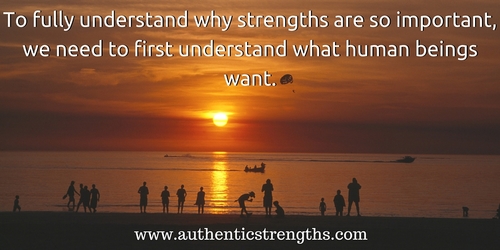May 30, 2016
Move From What’s Wrong to What’s Strong
To fully understand why strengths are so important, we need to first recognize what human beings want.
Human beings have some fundamental needs that include expressing who we are, being recognized/valued/accepted by others, and feeling like we’re part of something bigger than ourselves. These are basic nutrients that nourish the human psyche.
All living things — people included — have innate tendencies that define our uniqueness. Our uniqueness represents our character and what we treasure about ourselves. This is where our character strengths come in.
In a nutshell, character strengths are those aspects of our personality that define what’s best in us, and they are collectively responsible for our greatest achievements and fulfillments. We each possess all twenty-four of these strengths in varying degrees and combinations. Let’s take a look at the different categories of character strengths.
- Signature strengths: Our signature strengths are those that feel almost as important to us as breathing. They come naturally, and we feel energized and satisfied when we are expressing them. And when others see them in us, we feel understood in an important way. Strengths that are not signature are defined as middle, or lesser, strengths. Sometimes, listed among these middle strengths, we also find strengths that once were signature — core to our identity and expressed often. But due to neglect or discouragement from others, they are now expressed only infrequently.
- Situational strengths: Situational strengths are those we can call forth in good measure when necessary. The difference between situational strengths and signature strengths is that people need to express signature strengths to feel whole, but are comfortable expressing situational strengths only when they are needed.
- Strengths combinations: Character strengths — they rarely exist alone — mostly occur in combinations. Some examples of powerful strengths combinations are prudence and creativity, as well as judgment and zest, because they moderate and balance each other.
Self-awareness is a key component to success. In developing self-awareness, the first step is to explore our own unique set of strengths. While our weaknesses help us learn about ourselves, it is our strengths that primarily define us.
In my twenty plus years of coaching, I have yet to encounter a more powerful tool in developing self-awareness than exploring strengths. I have witnessed dramatic improvements in personal and interpersonal success when people set goals that are authentic and honor their core strengths —while honoring the strengths in others.
Speaker

 Fatima Doman
Fatima Doman